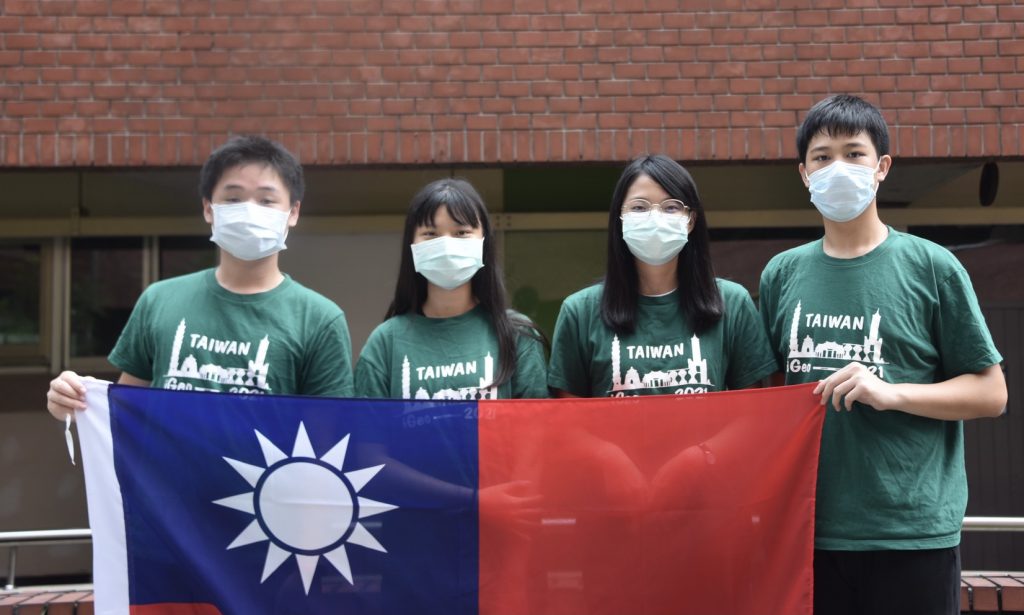The teachers of our department trained and led the contestants to participate in the 17th International Geography Olympiad. The students did very well in the competition and created the best ever record

—Below is the related news—
International Geography Olympiad took place online for the first time, Taiwan won 2 golds, 1 silver and 1 bronze, the best result in history.
Global pandemic has still been going on, disturbing many international activities being held. Originally on August 11-16, the 17th “International Geography Olympiad” competition was going to be held in Istanbul, Turkey, switching to online. Taiwanese representatives were Zi-Qiang Su, Shi-Xuan Li, Qian-Yi Zhuang, and Li-Yun Mei. The four contestants showed their great strength and stability and all won the medals. They won 2 golds (Zi-Qiang Su, Shi-Xuan Li), 1 silver (Qian-Yi Zhuang), and 1 bronze (Li-Yun Mei), it was the best result in history. Among all the participating countries, the number of gold medals is second only to Singapore, and tied for the second place with Japan and Russia.
The International Geography Olympiad Competition has been held since 1996, and the qualifications of the contestants are limited to students aged 16 to 19 who are selected by the national competition. The competition mainly consists of three tests, Fieldwork Exercise and Written Response Test each accounting for 40%, and Multi-media Test accounting for 20%. The whole process is in English, which is different from the Olympia events in other disciplines. Hence, the contestants must have both academic ability, foreign language ability, and discussion performance, which is extremely difficult. A total of 180 contestants from 46 countries participated in the 17th “International Geography Olympiad”.
Affected by the COVID-19 pandemic, almost all students around the world are forced to study at home, and the International Geography Olympiad Committee announced at the beginning of this year that it will switch to online competitions. Jun-Jia Zhang (one of the professors of our department) said that the physical training courses on the weekends were originally arranged for our country’s current and reserved contestants. However, the local epidemic broke out in May, they had to switch to online training, and the national team training was also rescheduled to the beginning of August to directly connect to the participation in the international competition. Jun-Jia Zhang said that in order to deal with the change in the competition format, this year, the contestants practiced the Fieldwork Exercise to strengthen their answering on the computer, including increasing the use of digital tools such as Google Maps and Google Earth, making presentations, and even familiarizing themselves with the process work such as scanning and uploading answer sheets.
The switch to online formats for international events also reflects the issue of the digital gap. Team leader teacher Bing-Sheng Wu observed that some teams from developing countries were unable to connect during the video poster presentation due to the unstable local network. Compared with the domestic digital infrastructure and students’ digital ability, students don’t need to worry during the exam, and can focus on answering the questions. Although the Fieldwork exercise questions include relatively unfamiliar situations such as the geology of Istanbul and the Mediterranean-type ecosystem, the Taiwanese contestants can still utilize their analytical and judgment skills.
This international competition is guided and supported by the Ministry of Education/National Education Administration, and the geography department of NTNU prepared training and competition matters. Since 2002, Taiwanese High School Geography Olympiad Competition has been organized by the Geography Society of China for high school students. Taiwanese students have repeatedly reported good results on the international competition stage, which has also inspired domestic students who love geography to develop their aspirations.
Shu-Min Shen, associate professor of the Department of Geography of NTNU, who is currently the co-chair of the International Geography Olympiad Special Group, said that Taiwanese high school geography education covers a wide and deep range. The ability to adapt to changes, disciplines integration and international communication will also be improved year by year under the influence of new education curriculum. At the same time, due to the sponsorship and support of many units, such as, Mr. Yun-Gang Ying Memorial Foundation, Agriculture, Forestry and Aviation Surveying Institute of the Forestry Bureau, Yehliu Geopark, etc., students who love geography and care about environmental and social issues can have the opportunities for learning and international exchange.